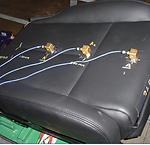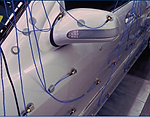Accelerometers
Uniaxial ICP & Charge Output
PCB’s Piezoelectric ICP sensors incorporate built-in, signal-conditioning electronics which convert the high-impedance charge signal that is generated by the piezoelectric sensing element into a usable low-impedance voltage signal that can be readily transmitted, over ordinary two-wire or coaxial cables, to any voltage readout or recording device. The uniaxial General Purpose ICP accelerometers are used for Routine vibration measurements, Product qualification studies, Machinery Studies, Product testing and Vibration control.

Triaxial ICP & Charge Output
Triaxial accelerometers provide simultaneous measurements in three orthogonal directions, for analysis of all of the vibrations being experienced by a structure. Each unit incorporates three separate sensing elements that are oriented at right angles with respect to each other.

Miniature ICP & Charge Output
Structured with highly sensitive piezoceramic sensing elements, miniature Ceramic Shear ICP® Accelerometers have an excellent signal-to-noise ratio, high measurement resolution, and are ideal for conducting low-level vibration measurements. Due to their inherent higher sensitivity, a ceramic ICP® accelerometer can be assembled with a smaller mass than comparable quartz units, resulting in a sensor that is lighter in weight, has a higher frequency response, and has a lower noise floor.
High Temperature ICP Output (Upto 163 Deg. C)
HALT, or Highly Accelerated Life Testing, exposes prototype and beta version products to severe thermal and vibration stress cycles in an effort to determine their mean time to failure and precipitate and detect design and manufacturing problems. HASS, or Highly Accelerated Stress Screening, is a product specific process, which exposes production run items to thermal and vibration stress cycles in an effort to precipitate and detect latent manufacturing defects and component problems.
High Temperature Charge Output
Charge mode output accelerometers use piezo-ceramic sensing elements that output an electrostatic charge signal proportional to the applied acceleration. These sensors can operate at extremely high temperatures because they do not contain the built-in signal conditioning electronics that limit the temperature range of ICP® accelerometers. Charge mode sensors are used in the testing of gas and steam turbines, jet engines, high power motors, exhaust systems and automobile engines where temperatures can range from 500 °F (260 °C) to 1200 °F (649 °C).
DC MEMS Uniaxial & Triaxial
MEMS DC response sensors are used to measure low frequency motion down to zero hertz. These accelerometers are used in applications such as structural monitoring, aerospace vibration testing, driveability and gravitational force measurements. Each series includes a full scale measurement range from ± 2g to ± 200g and features low spectral noise with high resolution.
Shock ICP and MEMS
Piezoelectric ICP® accelerometers afford a very high signal output (+/- 5 volts full scale) and the ease of two-wire electrical connectivity. Their inherent ruggedness enables them to be severely over ranged without damage. The addition of internal mechanical isolation minimizes the high frequency stress that would otherwise be encountered by their ceramic sensing elements. This mechanical isolation, coupled with an internal 2-pole electrical filter, built into the ICP® circuitry, tailors the overall accelerometer response to assure data quality to frequencies as high as 10 kHz. Depending on the specific model, accelerations in excess of 50 kg can be successfully measured. These modern designs, with their internal elastomeric isolation materials are verified through calibration to remain dynamically linear and are enabling piezoelectric accelerometers to operate in increasingly severe acceleration environments.





Modal / Structural Test
This ICP® accelerometers, and their accessories, are designed to address the needs of multi-point modal and structural test measurement applications. This equipment was developed in conjunction with the world renowned University of Cincinnati Structural Dynamics Research Laboratory and proven in real-world testing situations. Each unit in this family includes TEDS functionality as an option. This sensor High-output, piezoceramic sensing elements for strong output signal levels when measuring lower-amplitude input vibrations.
Cryogenic ICP®
We offer specially designed and tested ICP® (IEPE) accelerometers for conducting vibration measurements under demanding conditions. Laser welded, hermetically sealed housings offer further protection from the environment. This accelerometers address cryogenic applications to - 320 ºF (- 196 ºC). Prior to shipment, each sensor undergoes a series of temperature cycling tests in additional to a final calibration.
Seismic
High sensitivity ICP® accelerometers are specifically designed to enable the detection of ultra-low-level, low-frequency vibrations associated with very large structures, foundations, and earth tremors. Vibration monitoring of civil structures and treasured monuments can be an essential practice for ensuring the safety of occupants or protecting the structure from catastrophic demise.
Crash Test
We provide automotive crash accelerometers for high-G impact events. These sensors are a rugged and reliable drop-in replacement for other models on the market. We offer high-quality crash sensors with a low cost-to-own. Piezoresistive MEMS crash accelerometers are offered in both damped and undamped versions for High-G impact events. These models are designed for crash testing, anthropomorphic testing, sled testing and similar applications that take advantage of its low 1-gram mass, standard low transverse sensitivity and standard low zero G offset.





